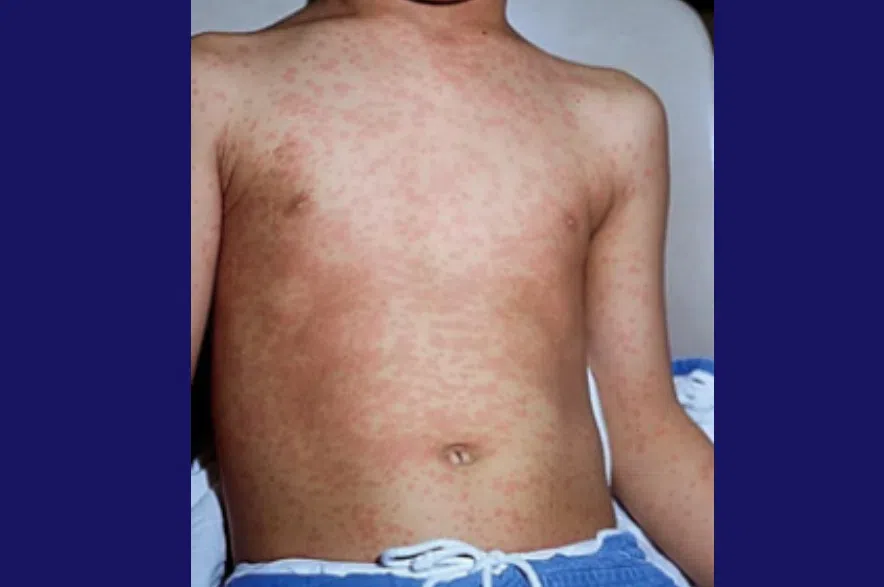The Saskatchewan Health Authority (SHA) issued a notice warning of measles exposure risk in Saskatoon on Saturday after cases of the potentially deadly virus were reported in the city.
This week, an infant born prematurely and infected with measles died in southwestern Ontario after being infected with the virus while in the womb through their mother, who was not vaccinated.
Read more:
- Sask. government doubles household financial assistance for wildfire evacuees
- Air quality warnings from wildfire smoke issued in Saskatchewan
- Suspicious fire at provincial fire base near Prince Albert investigated as arson
Sites where people may have been exposed include a school bingo night and two baseball games, including the Saskatoon Berries game on June 2.
The June 7 alert says people should monitor for measles symptoms for up to 21 days after exposure if they were at the following places at the reported times:
• North Park Wilson School (1505 9th Avenue North) on Thursday, May 29 from 6 p.m. to 10 p.m. for “Family Bingo Night.”
• A baseball game at Riversdale Diamond No. 1 in Riversdale Kiwanis Park on Edmonton Avenue on Friday, May 30 from 6 p.m. to 8 p.m.
• A Saskatoon Berries baseball game at Gordie Howe Sports Complex (1525 Avenue P South) on Monday, June 2 from 6:30 p.m. to 7:30 p.m.
The SHA said people should call HealthLine 811 if they were exposed and are unvaccinated, unsure of their vaccination status or develop measles symptoms.

A red blotchy measles rash, which develops on the face and spreads down the body about three to seven days after symptoms begin. (Health Canada website)
What are the symptoms of measles?
The SHA said that the symptoms of measles include fever, cough, runny nose, red eyes, fatigue, irritability (feeling cranky or in a bad mood), small, white spots (known as Koplik spots) inside the mouth and throat, and a red blotchy rash which develops on the face and spreads down the body about three to seven days after symptoms begin and can last four to seven days.
The SHA said anyone who has any of the listed symptoms and was at any of the listed locations during the identified times, should call HealthLine811, their primary care doctor or nurse practitioner.
Anyone in medical distress, should go to an emergency room or call 911, and identify they may have been exposed to measles.
The health authority also said that measles can be prevented by the safe, effective and free measles vaccine and with two doses, the vaccination is almost 100-per-cent effective
“Immunization is your best tool against measles, and two complete doses is what you need to have full vaccination. One dose is not enough,” the SHA’s Dr. David Torr said recently.
“Once immunized, the measles vaccine is extremely efficient, over 90 per cent of protection both against actually getting the infection and certainly against getting any complications or even death from measles.”
The second dose is especially important for people born in or after 1970.
Measles is spreading worldwide and the World Health Organization has expressed concerns.
“Get yourself up to date with the immunizations,” Torr said. “Otherwise you’re not properly protected against measles — and it is here.”
To check your vaccination records, Torr said to check MySaskHealthRecord, and if you can’t find anything there to contact public health.
Why is measles dangerous?
Measles is highly contagious and can spread very easily by breathing contaminated air after an infected person coughs or sneezes, or by touching a contaminated surface such as a doorknob or a shopping cart.
In rare cases can lead to respiratory failure, swelling of the brain and death.
If anyone breathes the contaminated air or touches a contaminated surface and then touches their nose, eyes or mouth, they can become infected.
The virus can live up to two hours in the air or on surfaces in a space where an infected person coughed or sneezed.
It can spread to others from four days before a rash appears until four days after a rash develops. Through this period, people need to stay in strict isolation to avoid spreading the infection.
A study published in the Canadian Journal of Public Health in 2024 found a decline in measles vaccination coverage children ages two to seven before, during, and after the COVID-19 pandemic.
— with files from Canadian Press
Read more:











